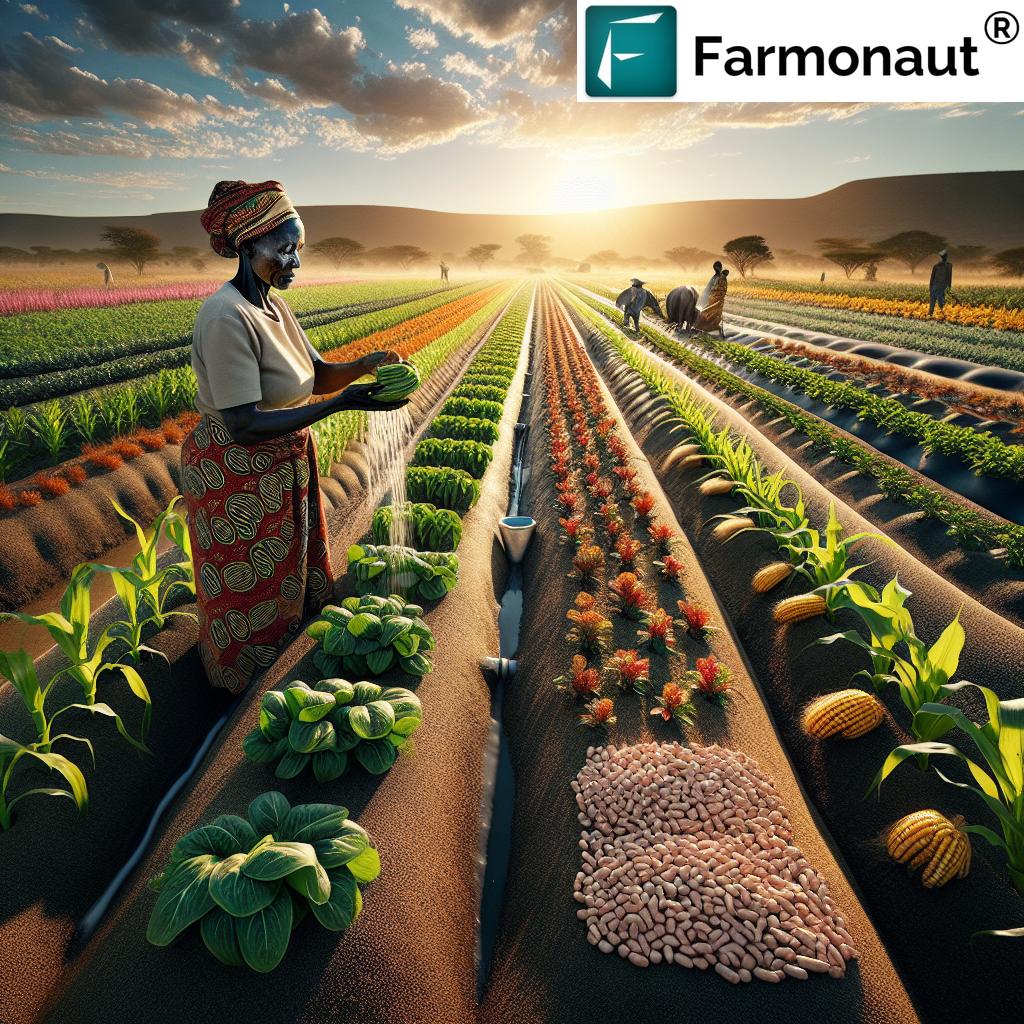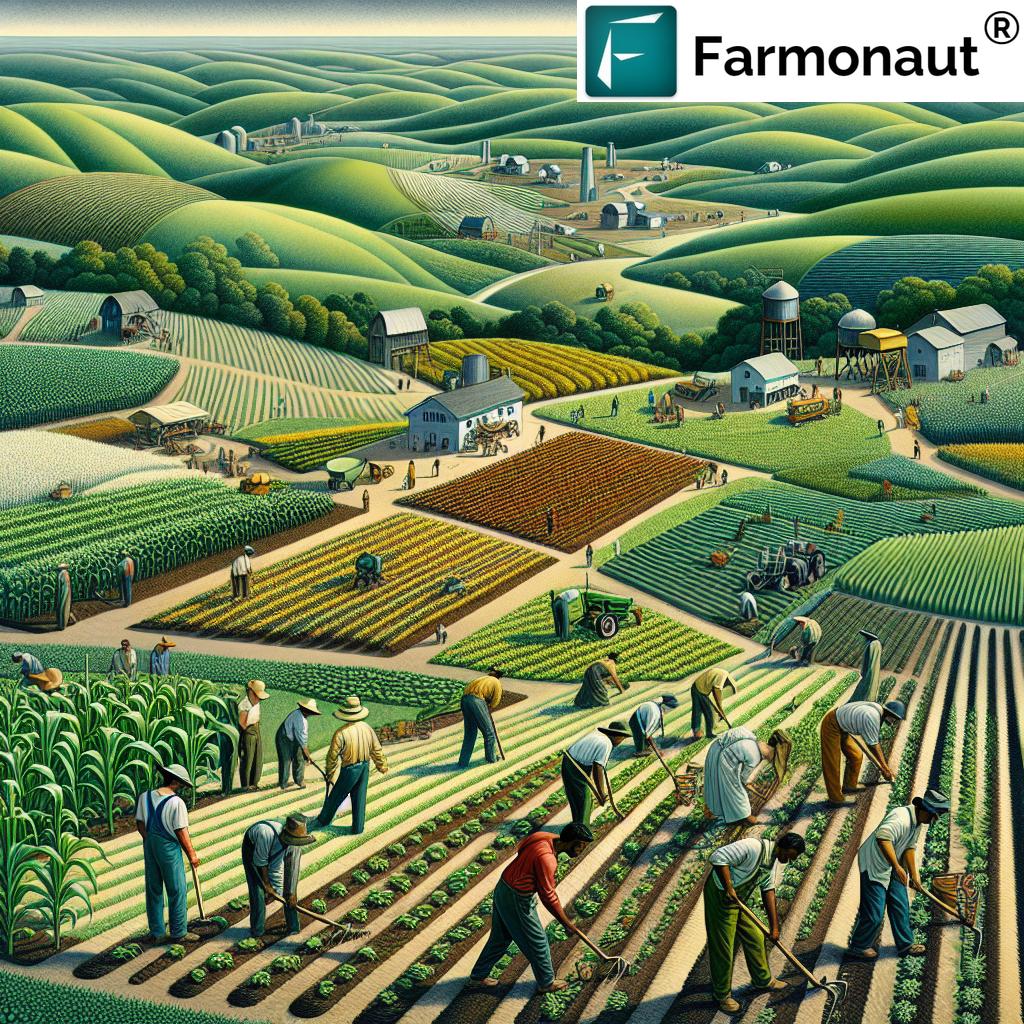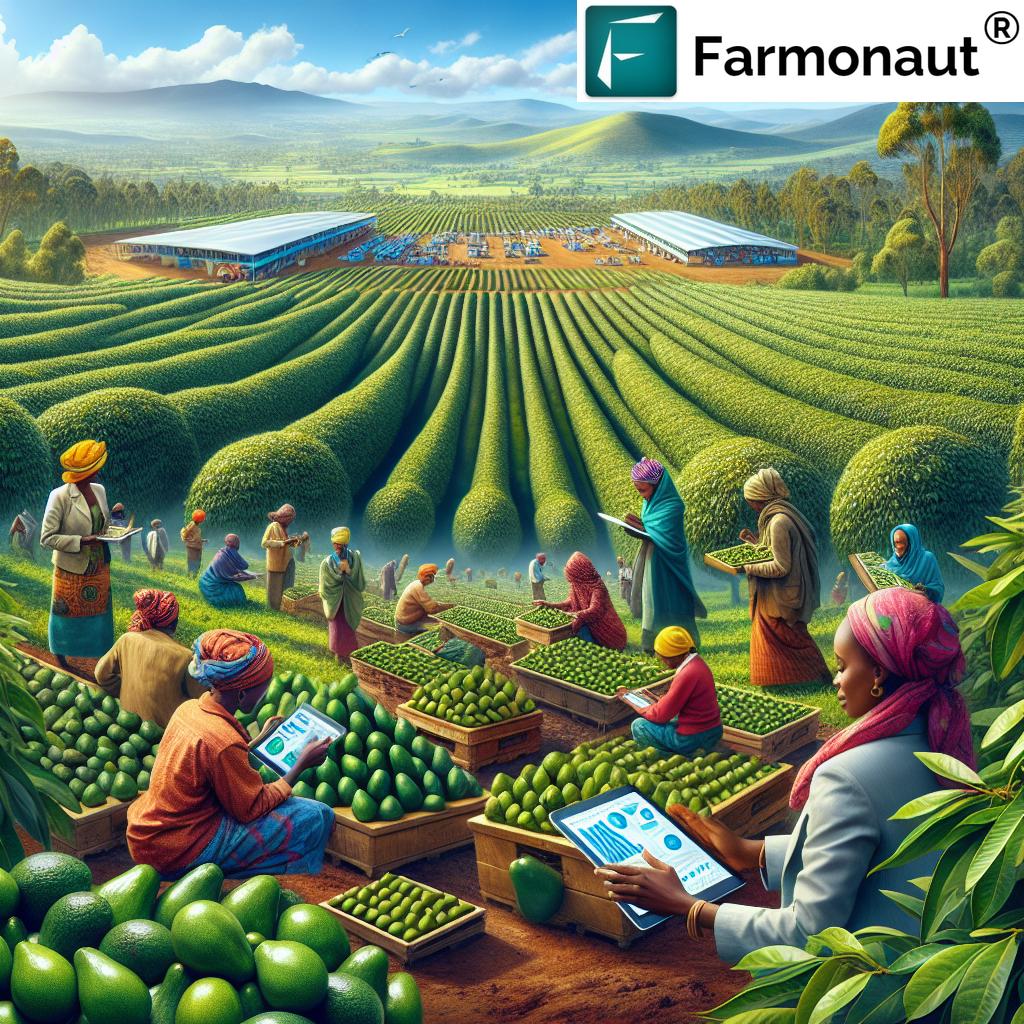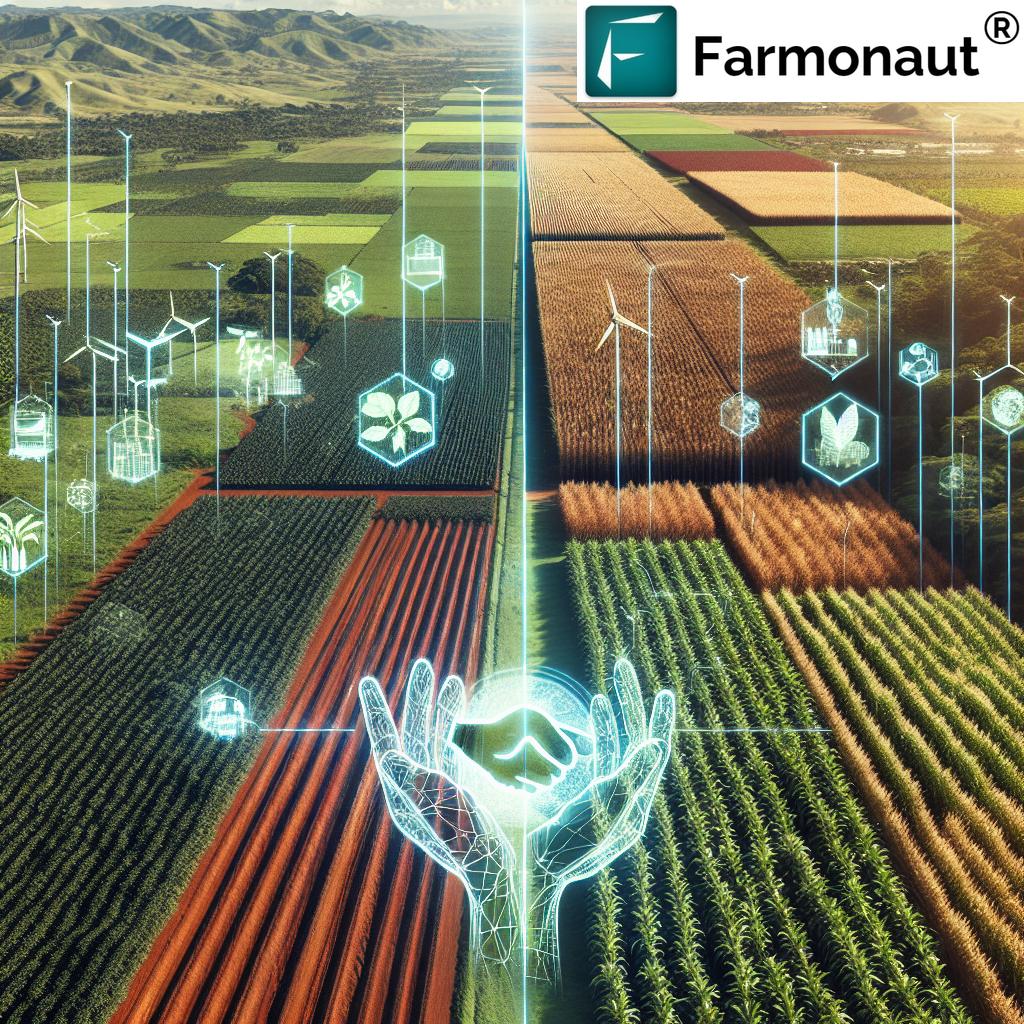Unlocking South African Agri-Success: Fresh Produce Distribution Strategies for Local and Global Markets
“South Africa’s fruit industry exports to over 100 countries, contributing significantly to its agricultural GDP.”
Welcome to our comprehensive guide on fresh produce distribution channels and agricultural sales strategies in South Africa’s thriving fruit industry. As representatives of Farmonaut, we’re excited to explore how our agritech solutions are revolutionizing supply chain management for both supermarkets and local markets. From juicy tomatoes and crisp onions to creamy avocados and sweet cherries, we’ll delve into the intricacies of price discovery mechanisms based on supply and demand principles.
In this article, we’ll take you on a journey through the world of international fruit export and uncover the key players in agricultural product distribution across major South African cities like Johannesburg, Pretoria, Durban, and Cape Town. Whether you’re interested in local sales or exploring export opportunities, we’ve got you covered with essential information on navigating the complex landscape of fresh produce marketing in RSA.
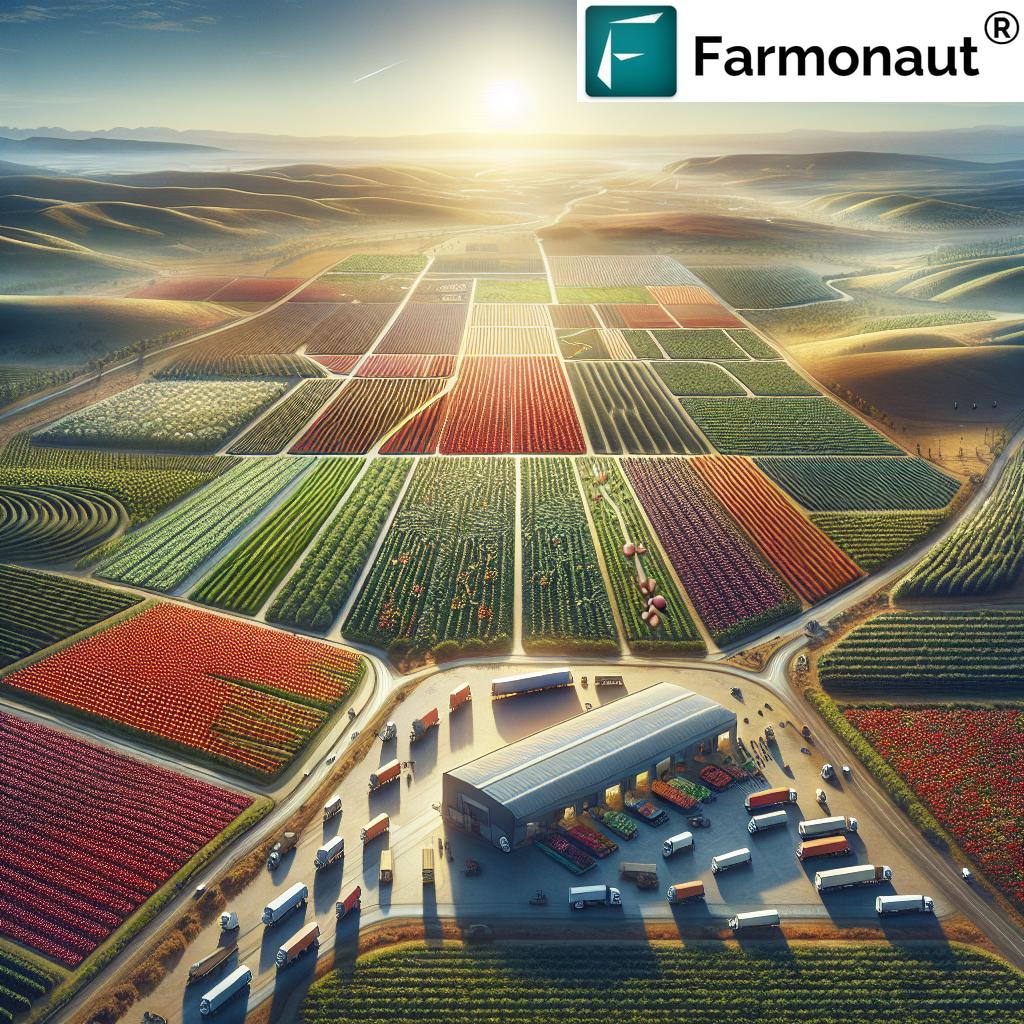
The South African Fresh Produce Landscape
South Africa’s agricultural sector is a powerhouse, with its fresh produce industry playing a crucial role in both domestic and international markets. The country’s diverse climate and advanced farming techniques allow for the cultivation of a wide variety of fruits and vegetables, making it a significant player in the global agricultural arena.
- Major Products: Tomatoes, onions, avocados, cherries, dates, and various citrus fruits
- Key Markets: Local supermarkets, regional fresh produce markets, and international exports
- Distribution Hubs: Johannesburg, Pretoria, Durban, Cape Town, and Bloemfontein
At Farmonaut, we understand the complexities of this dynamic industry. Our satellite-based farm management solutions are designed to optimize every step of the agricultural process, from planting to distribution. By leveraging our advanced technology, farmers and distributors can make data-driven decisions that enhance productivity and streamline operations.
Fresh Produce Distribution Channels in South Africa
The distribution of fresh produce in South Africa involves a complex network of channels, each with its unique characteristics and challenges. Let’s explore the main distribution channels and how Farmonaut’s solutions can optimize these processes:
1. Supermarkets and Retail Chains
Supermarkets are a significant channel for fresh produce distribution in South Africa. Major retail chains have established robust supply chain networks to source fruits and vegetables directly from farmers or through intermediaries.
- Products: Wide range including tomatoes, onions, avocados, and cherries
- Reach: National, with presence in all major cities and towns
- Pricing: Often based on long-term contracts with slight adjustments for market conditions
Farmonaut’s Role: Our supply chain management tools help supermarkets optimize their inventory, reduce wastage, and ensure timely delivery of fresh produce. By utilizing our satellite imagery and AI-driven insights, retailers can better predict demand and adjust their orders accordingly.
2. Local Fresh Produce Markets
These markets, also known as municipal markets, play a crucial role in the distribution of fresh produce, especially for smaller retailers and informal traders.
- Products: Diverse range of locally grown fruits and vegetables
- Reach: Regional, serving specific metropolitan areas and surrounding regions
- Pricing: Highly dynamic, based on daily supply and demand
Farmonaut’s Role: Our price discovery mechanisms help farmers and traders make informed decisions about when and where to sell their produce. By providing real-time data on market conditions, we enable more efficient transactions and fairer pricing.
3. International Export Market
South Africa’s fruit industry has a strong presence in the global market, exporting a significant portion of its produce to countries worldwide.
- Products: High-value fruits such as citrus, avocados, and cherries
- Reach: Global, with major markets in Europe, Asia, and North America
- Pricing: Influenced by international market trends, currency exchange rates, and trade agreements
Farmonaut’s Role: Our blockchain-based traceability solutions ensure transparency and authenticity in the export supply chain. This not only meets international regulatory requirements but also builds trust with overseas buyers.
Key Players in Agricultural Product Distribution
The successful distribution of fresh produce in South Africa relies on a network of intermediaries and service providers. Let’s examine the roles of these key players:
1. Commission-based Agents
These agents act as intermediaries between farmers and buyers, facilitating transactions in fresh produce markets.
- Role: Represent farmers, negotiate prices, and handle sales
- Compensation: Typically earn a percentage of the sale price
- Advantages: Provide market access and expertise to farmers
2. Exclusive Distributors
Some large-scale producers partner with exclusive distributors to handle their product distribution.
- Role: Manage logistics, marketing, and sales for specific brands or producers
- Reach: Often have national or regional coverage
- Advantages: Offer dedicated focus and specialized knowledge
3. Logistics and Transportation Companies
These companies ensure the timely and safe delivery of fresh produce from farms to markets and retailers.
- Services: Cold chain logistics, warehousing, and transportation
- Importance: Critical for maintaining product quality and reducing spoilage
Farmonaut’s Contribution: Our fleet and resource management tools help optimize logistics operations, reducing costs and improving efficiency in the distribution process.
Price Discovery Mechanisms in South African Agriculture
Understanding how prices are determined is crucial for both farmers and buyers in the fresh produce market. Let’s explore the main factors influencing price discovery:
1. Supply and Demand Dynamics
The fundamental principle of supply and demand plays a significant role in price determination.
- Seasonal Variations: Prices fluctuate based on harvest seasons and product availability
- Market Conditions: Economic factors, consumer preferences, and competing products affect demand
2. Quality and Grading
The quality and grading of produce significantly impact pricing.
- Grading Systems: Standardized grading helps in price differentiation
- Quality Premiums: Higher quality produce often commands better prices
3. Market Information Systems
Access to real-time market information is crucial for fair and efficient price discovery.
- Price Reporting: Regular updates on market prices for various products
- Technological Solutions: Digital platforms providing market insights
Farmonaut’s Impact: Our AI-driven advisory system, Jeevn AI, provides farmers with real-time market insights and price predictions, enabling them to make informed decisions about when and where to sell their produce.
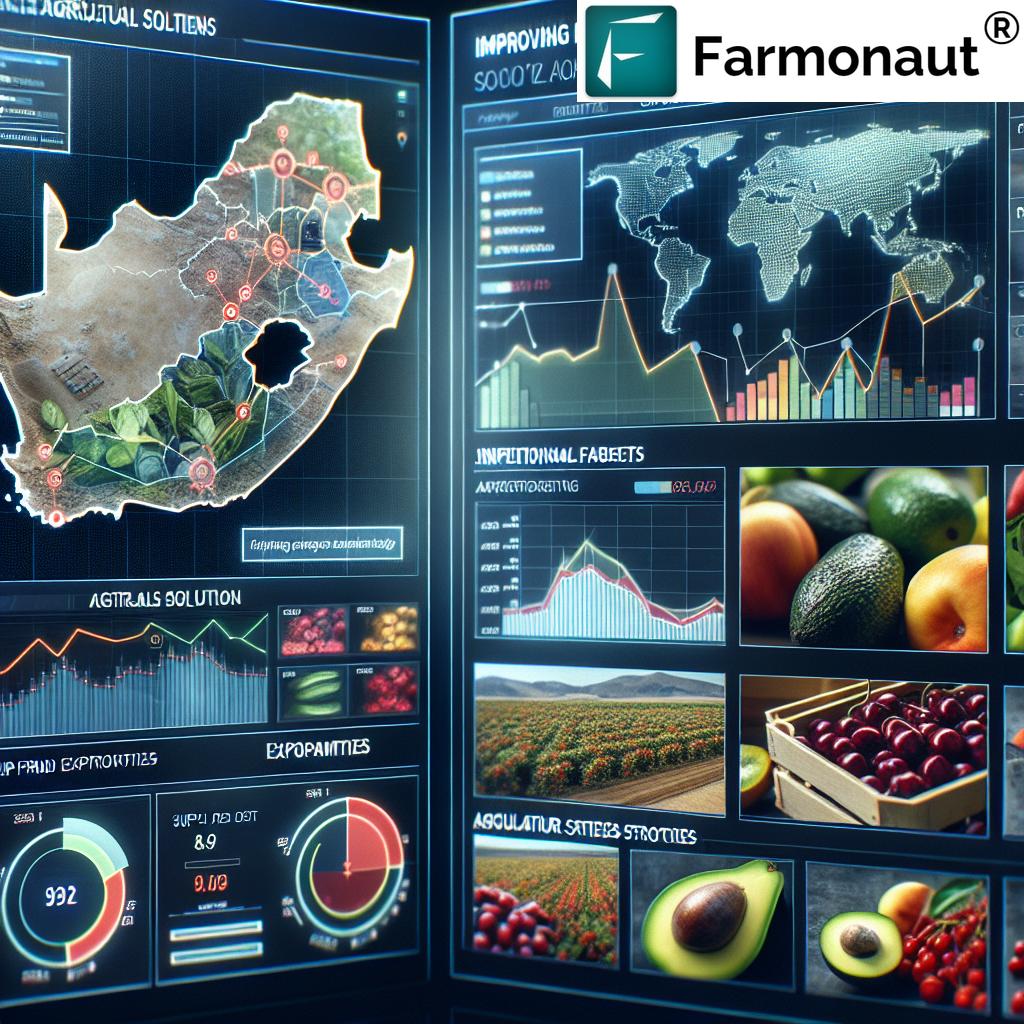
Marketing Channels Connecting Farms to Metropolitan Markets
The journey of fresh produce from farm to table involves various marketing channels. Let’s explore how these channels operate in South Africa’s major cities:
1. Direct Farm-to-Retailer Channels
Some large-scale farmers have direct relationships with supermarkets and retail chains.
- Advantages: Reduced intermediaries, potentially higher profits for farmers
- Challenges: Requires significant scale and consistent quality
2. Wholesale Markets
These markets serve as central hubs for fresh produce distribution in metropolitan areas.
- Location: Major cities like Johannesburg, Pretoria, Durban, and Cape Town
- Function: Facilitate bulk transactions between farmers, traders, and retailers
3. Online Platforms and E-commerce
Digital marketplaces are emerging as important channels for fresh produce sales.
- Benefits: Increased reach, convenience for buyers
- Challenges: Ensuring product quality and efficient delivery
Farmonaut’s Contribution: Our API solutions enable seamless integration of farm data with e-commerce platforms, enhancing transparency and efficiency in online fresh produce sales. Learn more about our API at Farmonaut Satellite API.
International Fruit Export: South Africa’s Global Reach
South Africa’s fruit industry has established itself as a major player in the international market. Let’s examine the key aspects of the country’s fruit export sector:
1. Major Export Products
South Africa exports a wide variety of fruits to global markets.
- Citrus: Oranges, lemons, and grapefruits
- Deciduous Fruits: Apples, pears, and grapes
- Subtropical Fruits: Avocados and mangoes
2. Key Export Destinations
South African fruits are exported to numerous countries worldwide.
- Europe: Major market for citrus and deciduous fruits
- Asia: Growing market, especially for citrus and subtropical fruits
- Middle East: Significant importer of South African fruits
3. Export Challenges and Solutions
Exporting fresh produce comes with unique challenges that require innovative solutions.
- Quality Control: Maintaining product quality during long-distance transportation
- Regulatory Compliance: Meeting international standards and phytosanitary requirements
- Market Competition: Competing with other global fruit exporters
Farmonaut’s Role: Our satellite-based crop monitoring system helps farmers maintain consistent quality throughout the growing season, ensuring that exported fruits meet international standards. Additionally, our blockchain-based traceability solutions provide transparency and build trust with international buyers.
“The fresh produce market in South Africa’s major cities handles over 5 million tons of fruits and vegetables annually.”
Optimizing Supply Chain Management with Farmonaut
At Farmonaut, we’re committed to revolutionizing supply chain management in the fresh produce industry. Our advanced agritech solutions offer numerous benefits for farmers, distributors, and retailers:
1. Real-time Crop Monitoring
Our satellite-based monitoring system provides up-to-date information on crop health and growth.
- Benefits: Early detection of issues, optimized resource allocation
- Impact: Improved crop yields and quality
2. Predictive Analytics
Leveraging AI and machine learning, we offer predictive insights for harvest timing and yield estimation.
- Advantages: Better planning for distribution and storage
- Outcome: Reduced waste and improved market timing
3. Blockchain-based Traceability
Our traceability solutions ensure transparency throughout the supply chain.
- Features: Product origin verification, quality assurance
- Result: Enhanced consumer trust and easier regulatory compliance
To experience the power of Farmonaut’s solutions, visit our web app or download our mobile applications:
Fresh Produce Distribution Channels in South Africa: A Comparative Overview
| Distribution Channel | Primary Products | Geographic Reach | Key Players/Intermediaries | Pricing Mechanism | Farmonaut Solution Integration |
|---|---|---|---|---|---|
| Supermarkets | Tomatoes, Avocados, Onions | National (Johannesburg, Pretoria, Durban, Cape Town) | Direct Suppliers, Wholesalers | Fixed Contracts with Market Adjustments | Supply Chain Optimization, Inventory Management |
| Local Markets | Varied Seasonal Produce | Regional (Major Cities and Surrounding Areas) | Commission Agents, Local Farmers | Daily Supply-Demand Based | Price Discovery, Real-time Market Insights |
| Export | Citrus, Avocados, Cherries | International | Export Companies, International Brokers | Global Market Trends, Currency Exchange | Blockchain Traceability, Quality Assurance |
| Online Platforms | Diverse Range of Fresh Produce | Urban Centers (Johannesburg, Cape Town) | E-commerce Platforms, Delivery Services | Dynamic Pricing Based on Availability | API Integration, Real-time Stock Updates |
| Wholesale Markets | Bulk Fruits and Vegetables | Metropolitan Areas (Johannesburg, Durban) | Wholesalers, Bulk Buyers | Auction-Based, Supply-Demand Driven | Market Analytics, Demand Forecasting |
Strategies for Success in South African Fresh Produce Distribution
To thrive in the competitive world of fresh produce distribution in South Africa, stakeholders need to adopt innovative strategies. Here are some key approaches:
1. Embrace Technology
Leveraging cutting-edge technology is crucial for staying ahead in the market.
- Satellite Monitoring: Use Farmonaut’s satellite-based crop monitoring for precise farm management
- AI-Driven Insights: Implement predictive analytics for better decision-making
- Blockchain Integration: Enhance traceability and build trust with consumers
2. Focus on Quality and Consistency
Maintaining high standards is essential for long-term success.
- Quality Control: Implement rigorous quality checks throughout the supply chain
- Standardization: Adhere to international grading and packaging standards
- Continuous Improvement: Regularly update farming and distribution practices
3. Diversify Distribution Channels
Expanding into multiple channels can reduce risk and increase market reach.
- Multi-Channel Approach: Engage with supermarkets, local markets, and export opportunities
- E-commerce Integration: Explore online sales platforms for direct consumer reach
- Value-Added Products: Consider processed or packaged products to expand offerings
4. Prioritize Sustainability
Sustainable practices are becoming increasingly important to consumers and regulators.
- Eco-Friendly Packaging: Adopt biodegradable or recyclable packaging solutions
- Water Management: Implement efficient irrigation systems to conserve water
- Carbon Footprint Reduction: Use Farmonaut’s carbon footprinting tools to monitor and reduce emissions
The Role of Agritech in Revolutionizing Fresh Produce Distribution
Agritech solutions, like those offered by Farmonaut, are transforming the fresh produce distribution landscape in South Africa. Here’s how technology is making a difference:
1. Enhanced Crop Monitoring
Satellite-based monitoring provides real-time insights into crop health and growth.
- Benefits: Early detection of issues, optimized resource allocation
- Impact: Improved crop yields and quality, leading to better products for distribution
2. Precision Agriculture
Advanced tools enable farmers to make data-driven decisions.
- Features: Soil analysis, weather prediction, pest management
- Outcome: More efficient use of resources, higher quality produce
3. Supply Chain Optimization
Technology streamlines the movement of produce from farm to market.
- Tools: GPS tracking, inventory management systems, blockchain traceability
- Results: Reduced waste, improved freshness, increased transparency
For more information on how Farmonaut’s agritech solutions can benefit your operations, visit our API Developer Docs.
Overcoming Challenges in South African Fresh Produce Distribution
While the South African fresh produce industry offers immense opportunities, it also faces several challenges. Let’s explore these challenges and how they can be addressed:
1. Climate Variability
South Africa’s diverse climate can lead to unpredictable growing conditions.
- Challenge: Drought, floods, and extreme temperatures affecting crop yields
- Solution: Implement climate-smart agriculture practices, use drought-resistant varieties
- Farmonaut’s Role: Provide accurate weather forecasts and crop monitoring to help farmers adapt
2. Infrastructure Limitations
Inadequate infrastructure can hinder efficient distribution.
- Challenge: Poor road conditions, limited cold storage facilities
- Solution: Invest in logistics infrastructure, develop regional distribution hubs
- Farmonaut’s Contribution: Optimize route planning and resource allocation through our fleet management tools
3. Market Access for Small-Scale Farmers
Smaller producers often struggle to access larger markets.
- Challenge: Limited resources, lack of market information
- Solution: Form cooperatives, leverage digital platforms for market access
- Farmonaut’s Impact: Provide affordable precision agriculture solutions and market insights to empower small-scale farmers
Future Trends in South African Fresh Produce Distribution
As we look to the future, several trends are likely to shape the fresh produce distribution landscape in South Africa:
1. Increased Digitalization
Digital platforms will play a more significant role in connecting farmers, distributors, and consumers.
- Trend: Growth of e-commerce platforms for fresh produce
- Impact: More direct farmer-to-consumer connections, improved price transparency
2. Sustainable Packaging Solutions
There will be a growing emphasis on eco-friendly packaging options.
- Trend: Biodegradable materials, reduced plastic usage
- Impact: Lower environmental footprint, increased consumer appeal
3. Vertical Integration
More companies may opt for a farm-to-table approach by controlling multiple stages of the supply chain.
- Trend: Retailers investing in farming operations, farmers expanding into distribution
- Impact: Improved quality control, potentially lower prices for consumers
Farmonaut: Your Partner in Agricultural Innovation
As we’ve explored throughout this article, Farmonaut is at the forefront of agricultural technology, offering solutions that address the unique challenges and opportunities in South Africa’s fresh produce industry. Our comprehensive suite of tools empowers farmers, distributors, and retailers to optimize their operations and stay competitive in a rapidly evolving market.
From satellite-based crop monitoring to blockchain traceability, our innovative technologies are designed to enhance productivity, improve quality, and streamline distribution processes. By choosing Farmonaut, you’re not just adopting a technology solution – you’re partnering with a team dedicated to revolutionizing agriculture through data-driven insights and cutting-edge innovation.
Ready to transform your agricultural operations? Explore our subscription options below:
Frequently Asked Questions
Q: How can Farmonaut help small-scale farmers in South Africa?
A: Farmonaut offers affordable precision agriculture solutions that allow small-scale farmers to access satellite-based crop monitoring, AI-driven insights, and market information. This helps them make informed decisions, improve yields, and access better market opportunities.
Q: What are the main benefits of using blockchain technology in fresh produce distribution?
A: Blockchain technology enhances traceability, ensuring transparency throughout the supply chain. This builds trust with consumers, helps meet regulatory requirements, and can potentially reduce fraud in the distribution process.
Q: How does Farmonaut’s technology contribute to sustainable farming practices?
A: Farmonaut’s solutions promote sustainability by optimizing resource use through precise crop monitoring, reducing waste through better yield predictions, and enabling carbon footprint tracking. This helps farmers adopt more environmentally friendly practices while maintaining productivity.
Q: Can Farmonaut’s solutions be integrated with existing farm management systems?
A: Yes, Farmonaut offers API solutions that can be integrated with various farm management systems. This allows for seamless data sharing and enhances the overall efficiency of agricultural operations.
Q: How does Farmonaut assist in international fruit exports from South Africa?
A: Farmonaut’s technology helps maintain consistent quality throughout the growing season, ensuring that exported fruits meet international standards. Our blockchain-based traceability solutions also provide the transparency required by many international buyers, facilitating smoother export processes.
In conclusion, the South African fresh produce industry is ripe with opportunities for those who can navigate its complexities and leverage innovative technologies. By embracing solutions like those offered by Farmonaut, stakeholders across the supply chain can optimize their operations, improve product quality, and tap into new markets both locally and globally. As we look to the future, the integration of agritech will continue to play a crucial role in shaping a more efficient, sustainable, and prosperous agricultural sector in South Africa.












